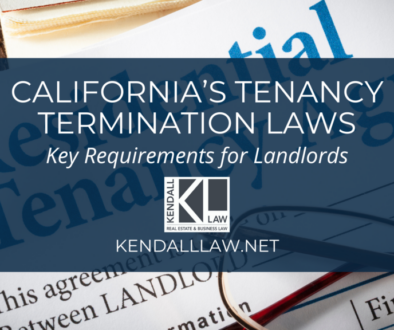California Real Estate Clean-up Laws
The California Association of Realtors (CAR) has sponsored several changes that impact your legal documents and real estate forms. A number of significant changes and clarifying definitions and terms are now in effect and you should be using these in your real estate practice and transactions.
So what do you do with all this?
Read it. Learn it. Come to us to help you apply it. We’re always here, ready to help realtors, agents and brokers navigate the legal requirements to run a sound real estate business.
Independent Contractor Relationship Reaffirmed
- This law more specifically reiterates that existing law permits salespersons and brokers to establish their relationship as one of either independent contractor or employment in the following way: One, it clarifies that the responsible broker has a duty to supervise salespersons and broker-associates regardless of whether their relationship is one of independent contractor or employment. Two, it defines the word “retained” to mean the relationship between a broker and licensee as one of either independent contractor or employment. And three, it removes the words “employ” “employee” and “employer” in describing the relationship between an agent and broker and substitutes the word “retain” or “retention” in their place.
Consolidates Real Estate Terms
- This law consolidates the definitions of a variety of real estate law terms including “single-family real property,” “listing agent,” “seller’s agent” and “broker associate,” and places these terms in a definitions section at the beginning of the Real Estate Law.
Plain Language Used
- Plain and clear language is introduced when appropriate. For example, the words “transferor” and “transferee” are replaced by “seller” and “buyer” under the TDS and NHD laws. The phrase “Nolo Contendere” is replaced by “no contest.” “Selling agent” is now “buyer’s agent.” “Transfers” is now “sales or transfers.”
Disclosure Regarding Agency Relationships Form
- The “third” agency disclosure is no longer required to be delivered from a buyer’s agent to the seller with the offer to purchase.
- The agency disclosure’s statement regarding confidential information has been expanded to accord with a common sense understanding and to allow brokers greater flexibility in protecting client confidences especially in a dual agency. It now states that a dual agent may not disclose to the other party confidential information such as facts relating to either the Buyer’s or Seller’s financial position, motivations, bargaining position, or other personal information that may impact price (unless given express permission).
- Eliminates the provision which would allow a buyer’s agent to deliver the agency form directly to the seller by certified mail.
- The reference to the “selling agent” on the agency disclosure form has been eliminated. The common-sense description “buyer’s agent” will take its place.
- The agency disclosure form already uses the phrase “seller’s agent.” However, the inclusion of the agency law on the backside of the form did not. Now all references on the form to the “listing agent” have been deleted. In its place, “seller’s agent” will be used.
- The reference to “associate licensees” on the agency disclosure form has been deleted. In its place, “salespersons and broker associates” will be used.
- Eliminates the exemption for 5+ multi-unit residential properties (that are not vacation rentals). Additionally, the law reaffirms and clarifies that the agency form is required for all commercial property, vacant land and ground leases coupled with improvements, and mobile homes in which DRE licensee participated in the transaction.
Other Agency Issues
- The definition of “listing agreement” has been expanded. In addition to a traditional listing arrangement, a “listing agreement” now includes the rendering of other services, for which a real estate license is required, to the seller pursuant to the terms of the agreement. The “agency listing” in which the seller reserves the right to procure their own buyer is now renamed the “seller reserved listing agreement.” This new name gives a much clearer description of how this type of listing functions.
Broker Practice
- “Broker associate” is now a defined term. Before, the Real Estate Law contained no definition of this basic term. Clarifies that a responsible broker has the duty to supervise and oversee the licensed acts of each salesperson and broker associate regardless of whether that retention contract specifies an independent contractor or employment relationship. Salespersons (including broker associates) may enter into agreements with other salespersons to share compensation provided that any compensation is paid through the responsible broker. (The law clarifies the holding of the Sanowicz case from 2015 without expressly referencing it). A copy of the listing agreement may now be delivered electronically and only need be provided “as soon as reasonably practicable” after the listing is signed, as opposed to simply at “the time the signature is obtained.” The latter requirement was sometimes a practical impossibility where the listing was signed electronically. The antiquated requirement that the responsible broker actually maintain physical possession of a sales agent’s licensee has been eliminated. The antiquated rules for marking out licensed information on the physical license whenever a licensee changes brokers have been eliminated. The rigid requirement that specifies agents and brokers give written notification to the DRE whenever a licensee changes brokers has been modified to allow the DRE to specify the manner of notice. The requirement that a broker notify the buyer of their right to receive a copy of the appraisal has been eliminated.
Corporate Brokers
- Allows that in the event of death or incapacity of a designated broker for a corporate brokerage, the corporation may continue to operate without interruption as long as an application for a new designated officer has been filed with the DRE within 10 days. Clarifies the existing rule that a designated broker may work though a corporate brokerage without maintaining their individual broker’s license as long as they have either: 1) passed the broker license examination and are now qualified to obtain a broker’s license, or 2) are currently licensed as a real estate broker.
TDS and NHD
- Eliminates the Transfer Disclosure Statement (“TDS”) exemption for multiple trustees where the trust is revocable. There is no trust exemption if the trustee – or trustees – is a natural person who is a trustee of a revocable trust and he or she is a former owner of the property or was an occupant in possession of the property within the preceding year. Thus, in the vast majority of circumstances, a trustee or trustees of a revocable trust will have to complete and deliver a TDS.
- Allows for electronic delivery of both the TDS and the NHD (Natural Hazard Disclosure Statement).
- The TDS cancellation right now explicitly requires delivery of a “completed” TDS and the listing agent’s visual inspection. Specifically, the timing of the right to cancel is triggered by completion of sections I, II and III of the TDS and delivery to either the buyer or the buyer’s agent. The buyer will have three days to cancel if the delivery was in person; or five days after delivery by deposit in the mail; or five days after delivery in electronic form (if the parties have agreed to conduct the transaction by electronic means).[Note: Section II is to be completed by the seller. Section III is the visual inspection for the agent representing the seller]. A real estate agent may complete his or her portion of the required disclosure by providing all of the required information on the agent’s inspection disclosure.
- Modifies the Natural Hazard Disclosure Statement (“NHD”) exemption for trustees by making it nearly the same as the TDS exemption for trustees, as indicated in the three bullet points above.
- As for the NHD cancellation right, the buyer will have three days to cancel if it is delivered in person, five days after delivery by deposit in the mail, or five days after delivery of an electronic record in transactions where the parties have agreed to conduct the transaction by electronic means.
- The words “transferor” and “transferee” are replaced by “seller” and “buyer” under the TDS and NHD laws.
Other
- Gender neutral language has been included where needed.
- References to the “Bureau of Real Estate” have been changed to the “Department of Real Estate.”
- An “installment land sale contract” is now termed a “real property sales contract.”
Author: Eileen Kendall





